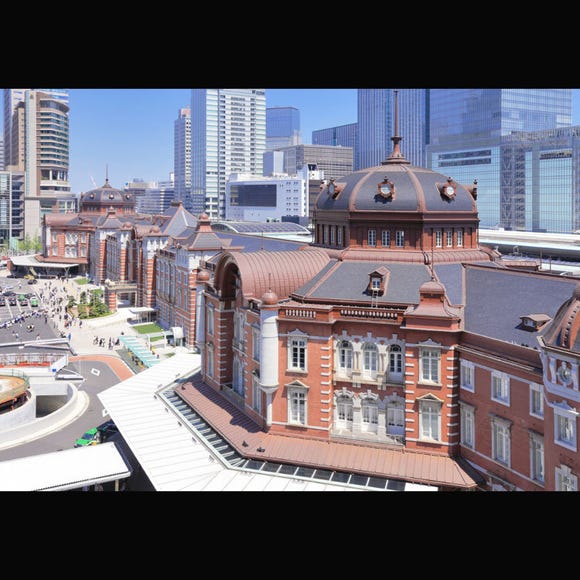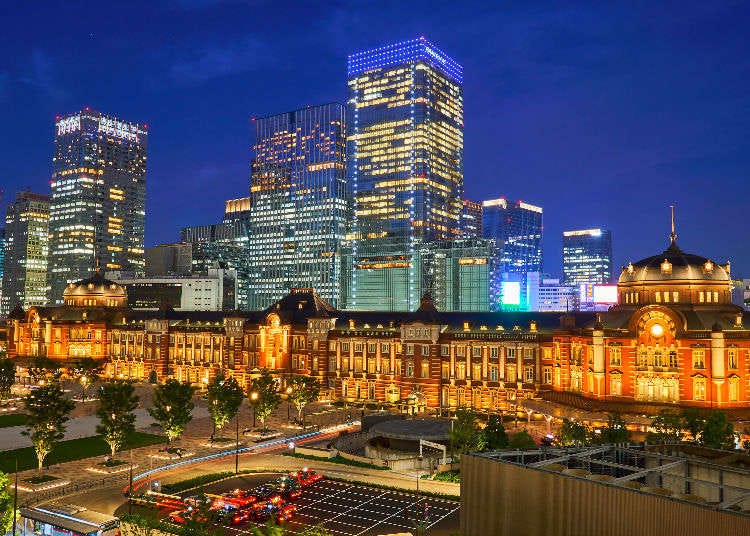
Tokyo Station and its beautiful, nostalgic red brick building is on the must-see list of every tourist to Japan. Besides its impressive value as a sightseeing spot, Tokyo Station is also an important hub that isn’t only served by major JR Lines such as Yamanote and Chuo but also is a major station for several shinkansen bullet trains. About 3,000 trains arrive and depart at Tokyo Station on a single day and when traveling around Tokyo, it’s going to be an important station for you as well. The station premises boast a large variety of shops and restaurants, offering both respite to rest tired legs and great opportunities for unique souvenir shopping.
However, there’s one downside: the station is so large, it’s easy to get lost! To keep that from happening, let’s take a thorough look at the structure of Tokyo Station, its major lines and exits, and what’s around the building.
- Table of Contents
-
- 7 Key Points of Tokyo Station to Remember
- The Main Lines of Tokyo Station
- What’s Around Tokyo Station’s East and West Exits?
- West Exit Directions: to the Imperial Palace and Marunouchi!
- To Marunouchi Underground North Exit
- East Exit Directions: to the JR Express Bus Terminal and Daimaru Tokyo!
- Transfers from Tokyo Station
- Taking the Keiyo Line from Tokyo Station to Tokyo Disney Resort
7 Key Points of Tokyo Station to Remember
1. The two main entrances are the Marunouchi Exit on the west side and the Yaesu Exit on the east side
Tokyo Station stretches rather long towards north and south but the major exits are on the west and east side of the station. Marunouchi Exit is the main exit of the west side and the magnificence of the red brick building that is Tokyo Station can be best appreciated here. It is made up of, from north to south, the Marunouchi North Exit, the Marunouchi Central Exit, and the Marunouchi South Exit on the ground floor. The basement floor has three exits as well: the Marunouchi Underground North Exit, the Marunouchi Underground Central Exit, Marunouchi Underground South Exit. Taking any of the Marunouchi Exits will lead you to the Imperial Palace and Hibiya.
The main exit of the east side is the Yaesu Exit and this is where a lot of stylish souvenir shops can be found. From north to south, the Yaesu Exit area includes the Yaesu North Exit, the Yaesu central Exit, and the Yaesu South Exit on the ground floor, while the Yaesu Central Exit ticket gates on the first basement floor provide great access to the Yaesu Underground shopping area.
2. JR East has a total of 28 platforms at Tokyo Station
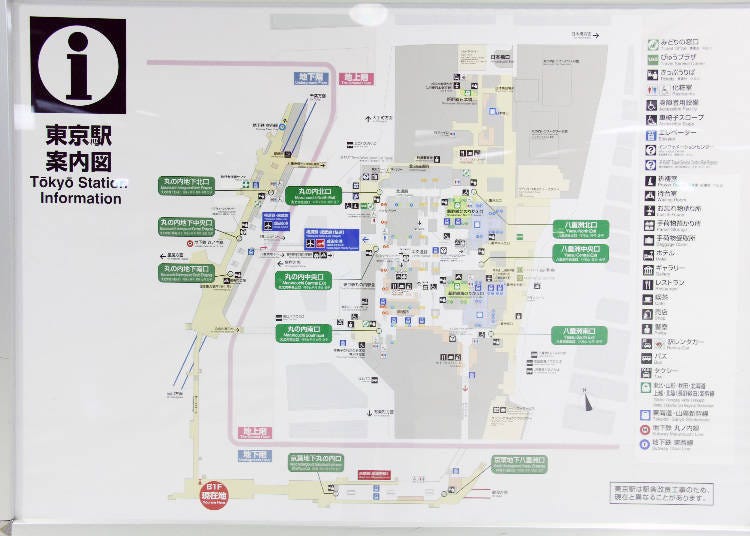
Including the shinkansen platforms, JR East serves a total of 28 platforms, 20 above ground and 8 underground – which is the largest number in all of Japan. The area of the station is an amazing 182,000 square meters large and would be able to fit the massive Tokyo Dome 3.6 times!
3. Tokyo Station is a historic hot spot
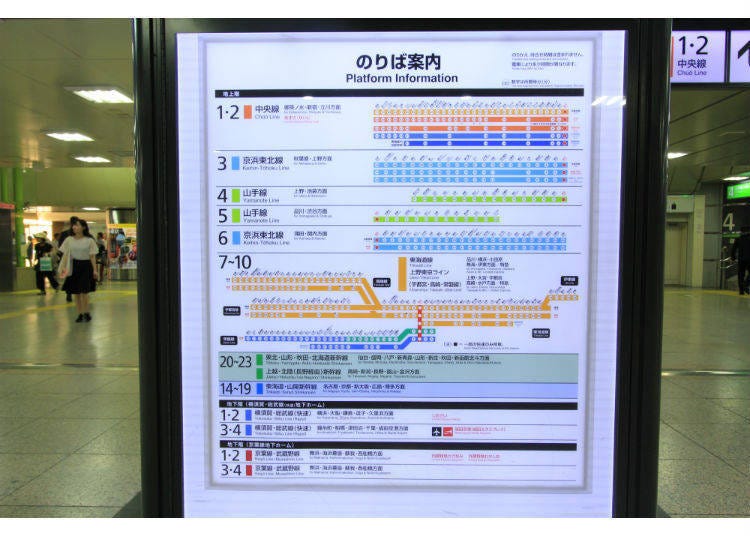
Tokyo Station was designed by Tatsuno Kingo, a representative architect of Japan’s Meiji area, and was completed in 1914 – the original building now serves as the Tokyo Station Marunouchi Station Building. In 2014, 100 years after the original completion of the characteristic building, thorough reconstruction and restoration works were carried out to make the historic spot more resistant to earthquakes and to fix age-related issues.
Especially noteworthy are the two dome roofs of the Marunouchi North Exit and Marunouchi South Exit. After their destruction in the air raids of World War II, they were rebuilt in 1947 but didn’t look much like the original architecture. This also was reverted in 2014 and the two domes now look like they did over 100 years ago.
4. The Marunouchi side and the Yaesu side are connected by the North Passage
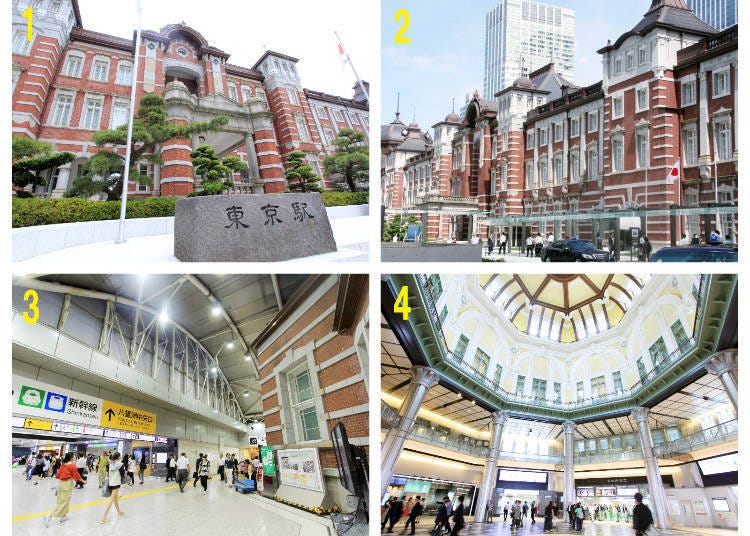
The west side where the Marunouchi exits are is connected to the east side and its Yaesu exits by the North Passage. This passage is available both on the ground floor and the first basement floor, directly connecting the Marunouchi North Exit and the Yaesu North Exit. There’s no passage like that directly connecting the south exits, so use the north passage to get from one south exit to the other.
5. Transfer to the shinkansen lines without passing through the JR ticket gates
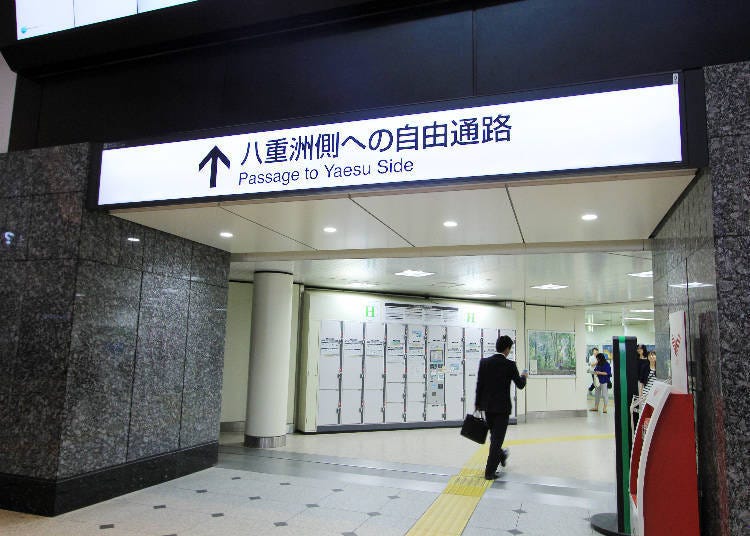
Naturally, the shinkansen bullet trains can only be accessed with special tickets and special ticket gates. Tokyo Station has designated shinkansen ticket gates labeled as “Transfer Gate,” located on the first floor near the Yaesu Exit area.
If you’re taking the shinkansen and arrive at Tokyo Station with a JR Line, such as the Yamanote or Chuo Line, you can directly transfer without having to pass through the JR ticket gates. Simply follow the North Passage, Central Passage, or South Passage within the ticket gates to get to the Yaesu side where the shinkansen transfer is located. Even if you didn’t buy tickets in advance, there is a ticket area just in front of the Transfer Gate.
Should you arrive at Tokyo Station by bus or taxi, you’ll find your way to the shinkansen area by taking the Yaesu North Exit, Yaesu Central Exit, Yaesu South Exit or Nihonbashi Exit.
6. There are plenty of shops both within and outside the ticket gates
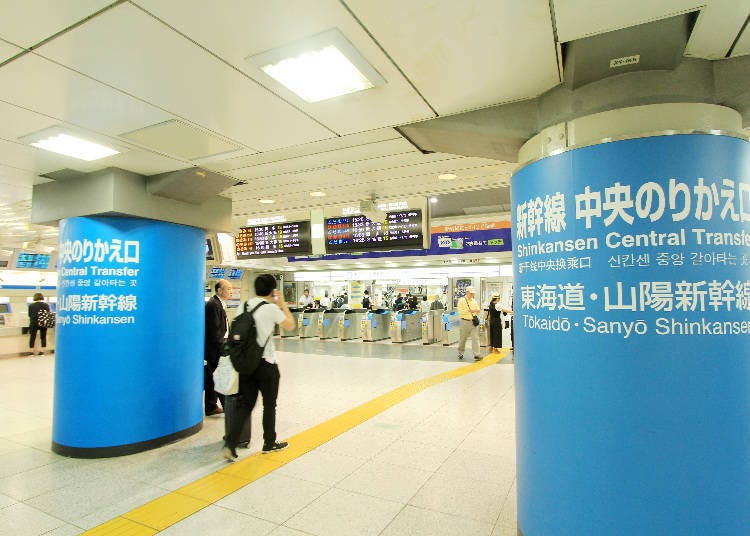
The first basement floor and the ground floor boast an astounding number of shops and commercial facilities, offering unique souvenirs and gourmet experiences. Here are some of the main shopping areas and shops at Tokyo Station:
● First Avenue Tokyo Station (Tokyo-eki Ichibangai)
Location: Yaesu Exit area B1F (outside the ticket gates)
First Avenue Tokyo Station is where the famous Tokyo Ramen Street and its 8 iconic shops can be found, as well as the three big sweets manufacturer shops of Tokyo Okashi Land. Another major highlight is Tokyo Character Street, uniting goods of Hello Kitty, Rilakkuma, Ultraman, and other well-known Japanese heroes and characters.
● Kurobei Yokocho (Black Fence Alley)
Location: Yaesu Exit area B1F, along the North Passage (outside the ticket gates)
This atmospheric gourmet area is defined by its beautiful black wall design, uniting modern style with traditional aesthetics. There’s a large variety of Japanese food to be tried, including yakitori, kushiyaki (skewered dishes), or Yonezawa beef. If you want to try Japanese sake, it’s also a recommended spot.
● GRANSTA
Location: Marunouchi area B1F, along the Central Passage (outside the ticket gates)
GRANSTA is a commercial facility that is rather colorful, mixing high-end brands with trendy shops for people from all walks of life. GRANSTA is also a great gourmet location and we especially recommend trying beef tongue here.
● GRANSTA MARUNOUCHI
Location: Marunouchi area B1F (outside the ticket gates)
This is another part of the GRANSTA complex, also located on the basement floor of the Marunouchi area. It’s known for diverse shops selling various fashion styles, miscellaneous goods, and organic food, as well as atmospheric cafés and bakeries.
● Daimaru Tokyo Station
Location: between Yaesu Central Exit and Yaesu North Exit
Daimaru is a long-established department store with a history of over 300 years. The massive shop spans from the first basement floor to the 13th floor and is directly connected to Tokyo Station on the ground floor and basement floor.
7. The highway bus terminal is at the Yaesu Exit area, the Hato Bus can be found on the Marunouchi side
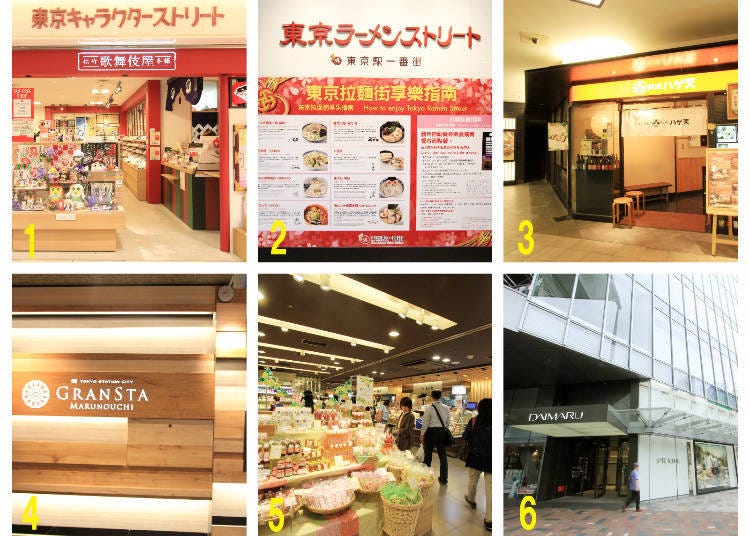
From Tokyo station, JR operates several highway buses that take you to areas like Hakone and Kawaguchiko, as well as closer places like Tokyo Skytree Town. Keep in mind that arrival and departure areas are separate! The departure and ticket area is just outside Yaesu South Exit, to the right. Take the “The Access Narita” bus for smooth and direct transfer to Narita Airport. It departs right in front of the Nihonbashi Exit.
On the other side of the station, you’ll find the departure and ticket area of Hato Bus at the Marunouchi exits. Simply leave the station via the Marunouchi North Exit and go left, the bus stop is right there.
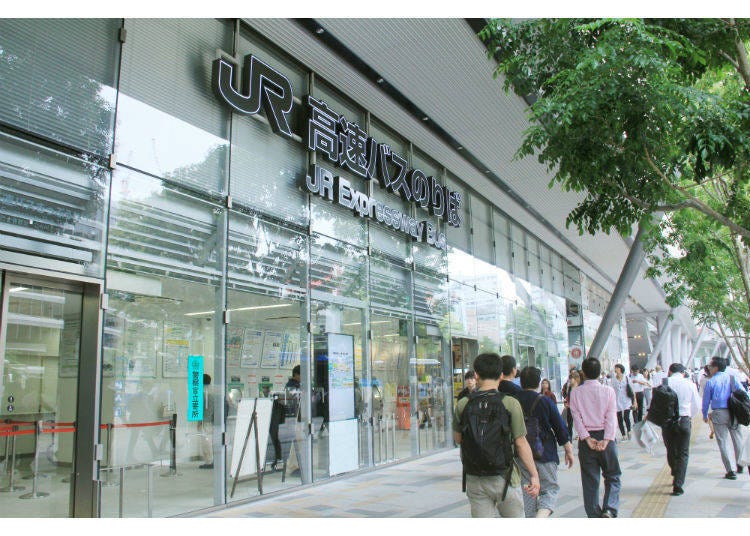
The Main Lines of Tokyo Station
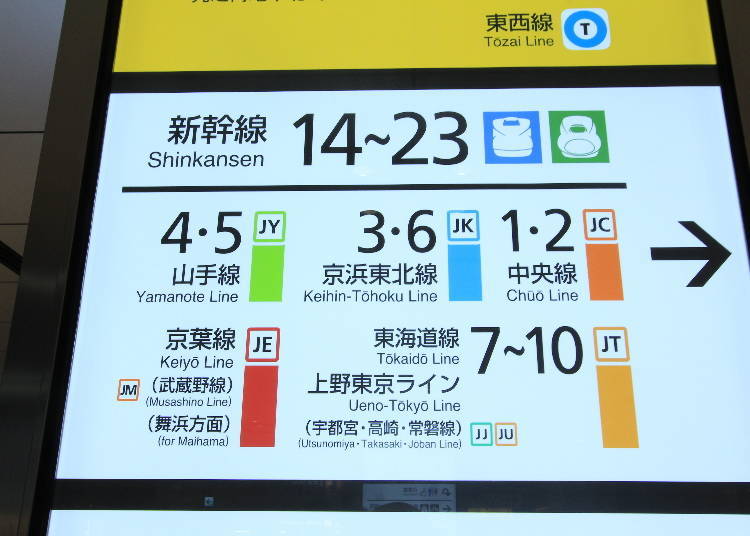
Tokyo Station is served by JR (JR East and JR-Central) and Tokyo Metro. Platforms 1 to 10 on the second floor belong to JR, serving as the arrival and departure platforms for the Chuo Line, the Keihin Tohoku Line, the Yamanote Line, the Tokaido Line, and the Ueno Tokyo Line. The Keio Line which takes you to Chiba and Maihama (Tokyo Disney Resort) is on the fourth basement floor, while the Narita Express can be found on the fifth basement floor. This information is important because it does take a bit of time to transfer from one line to another and you don’t want to find yourself missing a train because of that.
If you walk to Otemachi Station just 5 minutes away from Tokyo Station’s Marunouchi North Exit, you’ll also have access to Tokyo Metro’s Tozai Line, Chiyoda Line, Hanzomon Line, and Toei Subway’s Mita Line.
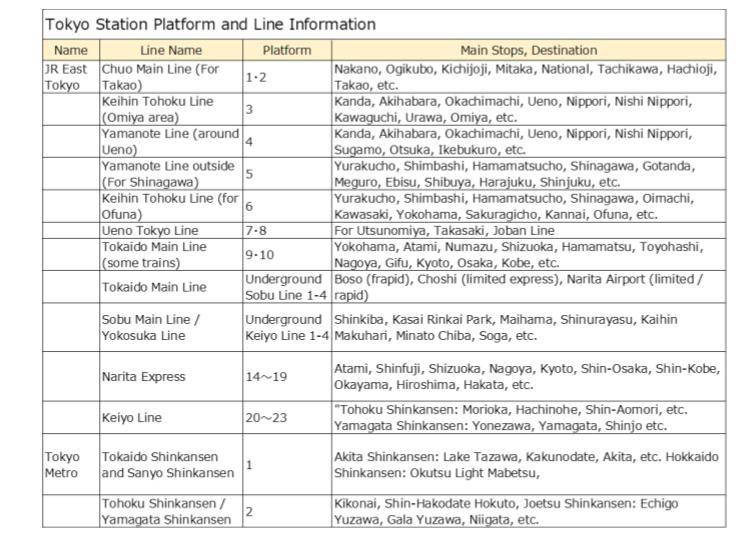
What’s Around Tokyo Station’s East and West Exits?
West Side: Marunouchi Exit Area
The Tokyo Imperial Palace (Wadakura Fountain Park, The Imperial Palace East Gardens), Marunouchi Building, Shin-Marunouchi Building, KITTE (JP Tower), Maruzen Marunouchi Main Store, Otemon Gate, Museum of the Imperial Collections, Tokyo Station Hotel, Tokyo Station Gallery, GRANSTA Marunouchi, Tokyo International Forum
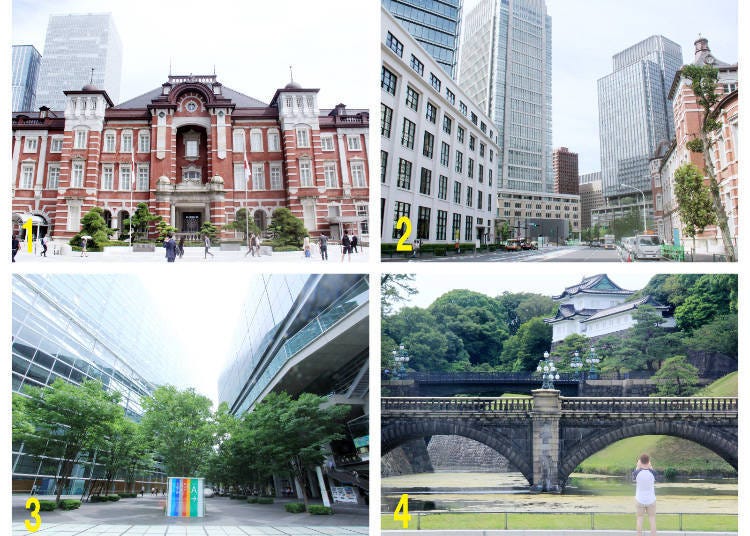
All thee Marunouchi side exits face the Tokyo Station Rotary which is surrounded by high-rise buildings such as the Marunouchi Building, the Shin-Marunouchi Building, and KITTE (the former Tokyo Central Post Office). Leave the station and go straight ahead to arrive at the moat of the Imperial Palace in about 5 minutes. Going left from the Marunouchi South Exit will take you to Hato Bus Terminal and the Tokyo International Forum.
East Side: Yaesu Exit Area

JR Express Bus Terminal, Four Seasons Hotel Marunouchi Tokyo, Daimaru Tokyo, Marunouchi Trust Tower, Nihonbashi Takashimaya, Hotel Metropolitan Marunouchi (Sapia Tower), Shangri-La Hotel, Tokyo, Yaesu Shopping Mall, Yaesu Book Center
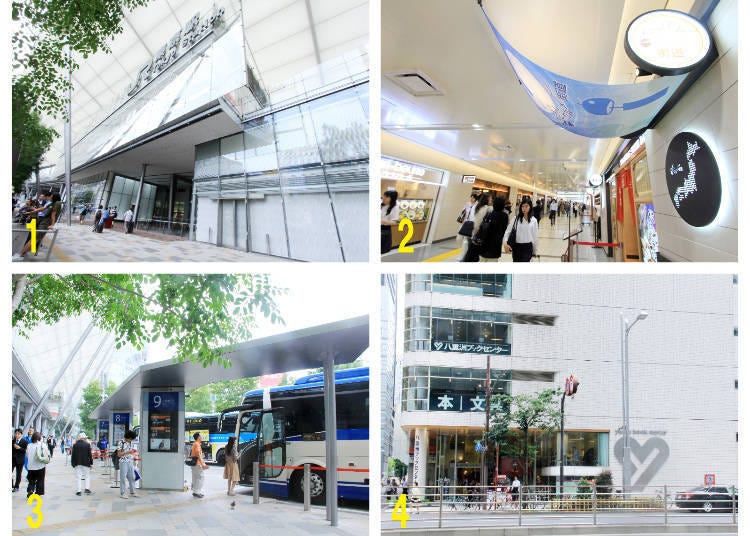
The first floor of the Yaesu Exit area has three separate exits. Taking Yaesu South Exit and going to the left will take you to the JR Express Bus Terminal. Yaesu Central Exit and Yaesu North Exit are both directly connected to Daimaru Tokyo. Leave the Yaesu ticket gates on the first basement floor to find yourself in front of a large shopping area and commercial facilities, including First Avenue Tokyo Station and Kurobei Yokocho. Daimaru Tokyo is also directly connected to the area. The Yaesu Exit area is a bustling downtown with numerous restaurants and pubs, as well as luxury and business hotels.

West Exit Directions: to the Imperial Palace and Marunouchi!
The main exits on JR Tokyo Station’s west side are, from north to south on the first floor, Marunouchi North Exit, Marunouchi Central Exit, and Marunouchi South Exit. On the second floor are, from north to south, Marunouchi Underground North Exit, Marunouchi Underground Central Exit, and Marunouchi Underground South Exit.
The Marunouchi Station building is a beautiful, Western-inspired red brick building, designated as an important cultural asset of Japan, so don’t hesitate to take a commemorative photo! If you’re transferring from the JR lines to Tokyo Metro Marunouchi Line, we recommend taking the Marunouchi Underground Central Exit ticket gates.
Here are the directions from JR Yamanote Line bound for Shinagawa and Shibuya (outbound) on platform 4 to each exit:
● To Marunouchi North Exit
1. Descend the stairs on the northern end of the platform.
2. Turn left right after the stairs.
3. Continue straight through the North Passage and pass the Marunouchi North Exit ticket gates.
4. Continue to the dome roof area and leave the station from here.
To Marunouchi Central Exit
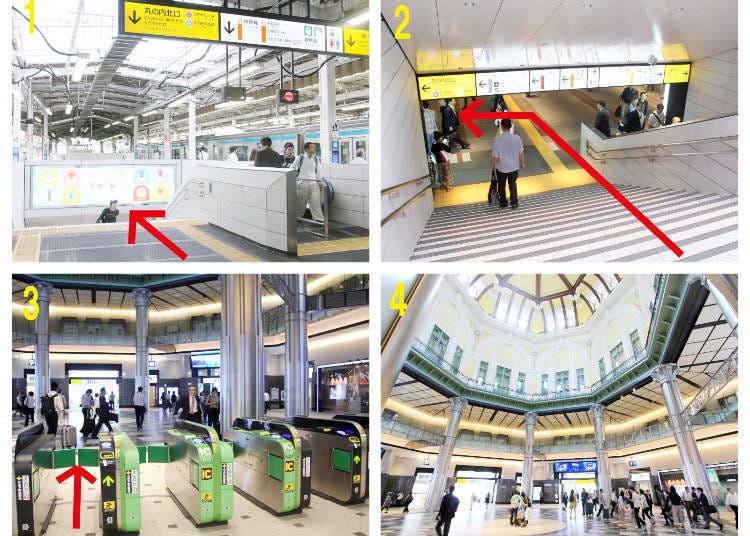
1. Descend either of the two stairs in the center of the platform and head for the Marunouchi Central Exit
2. Continue straight ahead through the Central Passage until you arrive at the brick wall. Turn right from there.
3. Exit the Marunouchi Central Exit ticket gates, just right of the brick wall.
4. Continue straight for a few steps and you’ll find yourself outside immediately.
To Marunouchi South Exit

1. Descend either of the two stairs on the southern end of the platform.
2. After descending the stairs, head towards Marunouchi South Exit.
3. Go straight through the South Passage and pass through the Marunouchi South Exit ticket gates.
4. Continue to the dome roof area and leave the station from here.
To Marunouchi Underground North Exit
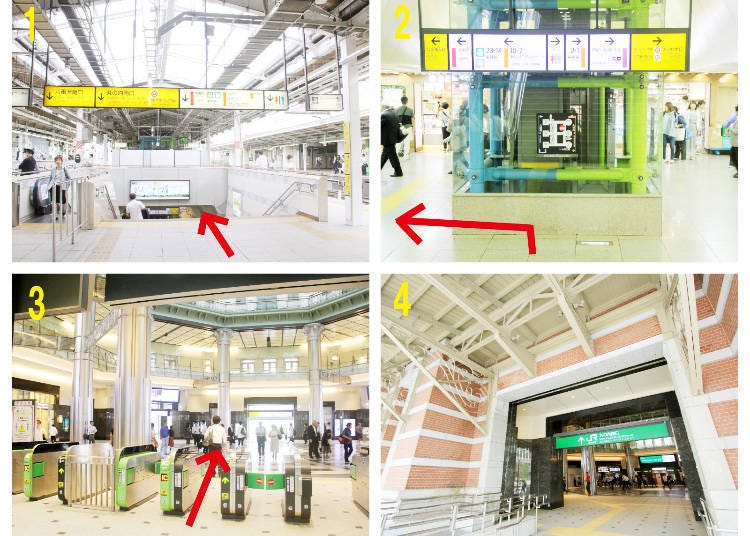
1. Follow the signs of “Marunouchi Central Exit” and descend either of the two stairs at the center of the platform.
2. Follow the Central Passage towards the Marunouchi Central Exit.
3. As you arrive at the western end of the Central Passage, turn right and take the passage on the right-hand side of the Marunouchi Central Exit ticket gates.
4. Take the stairs or escalator marked with “Narita Express.”
5. Turn right after going down the stairs.
6. Pass the corner shop called KIOSK to your right.
7. Go straight while following the signs saying “Marunouchi Underground North Exit.”
8. After passing the bookstore on the right-hand side, you’ll arrive at the Marunouchi Underground North Exit ticket gates.
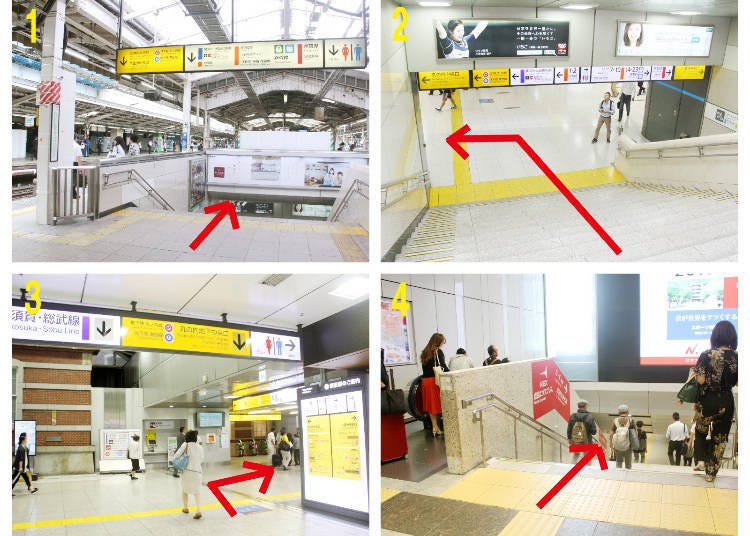
To Marunouchi Underground Central Exit
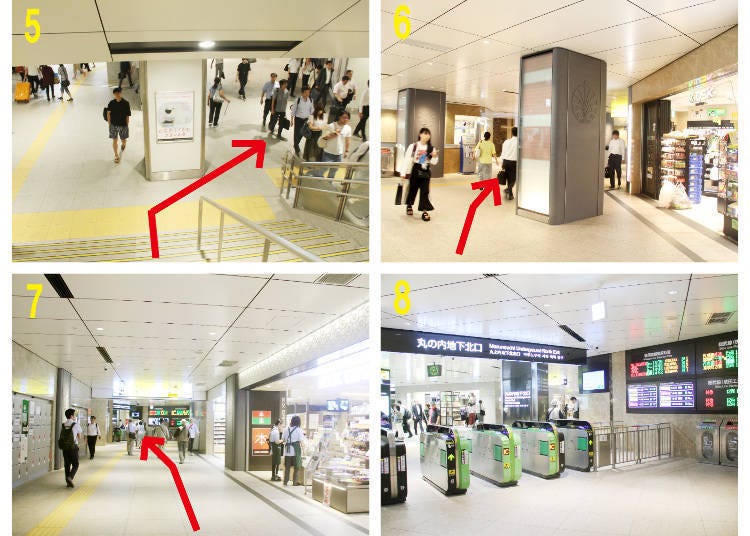
1. Follow the signs of “Marunouchi Central Exit” and descend either of the two stairs at the center of the platform.
2. Follow the Central Passage towards the Marunouchi Central Exit.
3. As you arrive at the western end of the Central Passage, turn right.
4. Pass in front of the Marunouchi Central Exit ticket gates and turn left immediately.
5. Take the stairs or escalator marked with “Narita Express.”
6. Turn right after going down the stairs and continue straight through the passage.
7. Go straight while following the signs saying “Marunouchi Underground Central Exit.”
8. After passing the bookstore on the right-hand side, you’ll arrive at the Marunouchi Underground Central Exit ticket gates.
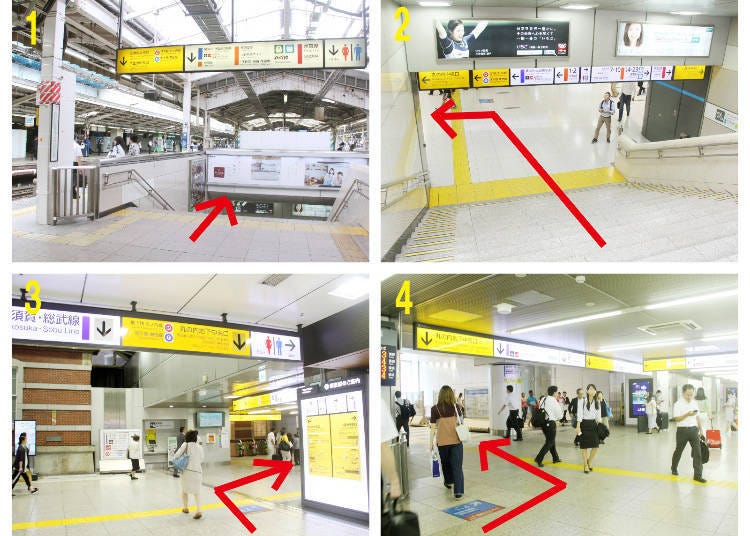
To Marunouchi Underground South Exit
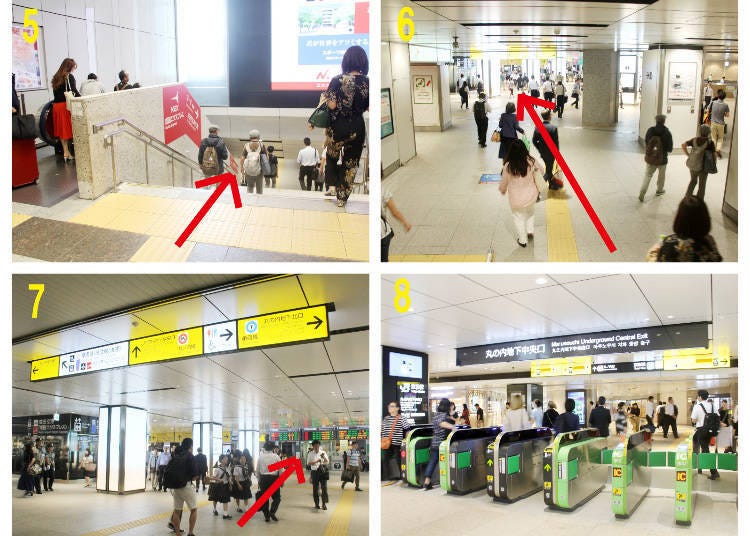
1. Follow the signs of “Marunouchi Central Exit” and descend either of the two stairs at the center of the platform.
2. Follow the Central Passage towards the Marunouchi Central Exit.
3. As you arrive at the western end of the Central Passage, turn right and enter the passage on the right of the Marunouchi Central Exit ticket gates.
4. Take the stairs or escalator marked with “Narita Express.”
5. Turn left after descending the stairs.
6. Pass by the elevator going to platform 3 and 4.
7. Follow the signs saying “GRANSTA MARUNOUCHI” and continue straight.
8. You’ll arrive at the Marunouchi Underground South Exit.
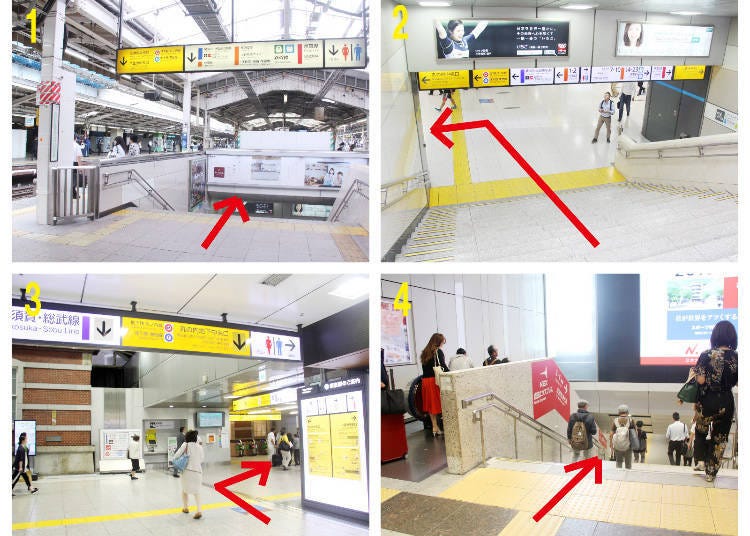
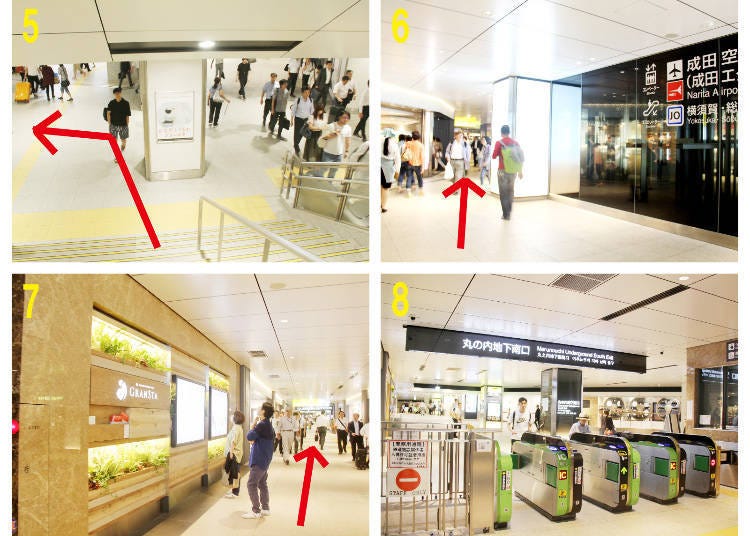
East Exit Directions: to the JR Express Bus Terminal and Daimaru Tokyo!
The main exits on JR Tokyo Station’s east side are, from north to south, the Yaesu North Exit, the Yaesu Central Exit, and the Yaesu South Exit on the ground floor. If you leave the Yaesu Exit ticket gates on the ground floor and go to the left (towards north), you’ll also find the Nihonbashi Exit. The JR Express Bus Terminal is right in front of the Nihonbashi Exit, so it’s good to keep in mind.
First Avenue Tokyo Station is right in front of the Yaesu Underground Central ticket gates. Continue straight ahead and you’ll get to the Yaesu underground shopping area.
Here are the directions from JR Yamanote Line bound for Shinagawa and Shibuya (outbound) on platform 4 to each exit:
● To the Yaesu North Exit
1. Descend the stairs at the northern end of the platform.
2. Turn right after the stairs.
3. Continue straight ahead, following the North Passage and pass through the Yaesu North Exit ticket gates.
4. You’ll arrive at the Yaesu North Exit and Daimaru Tokyo directly connected to it.
To the Yaesu Central Exit
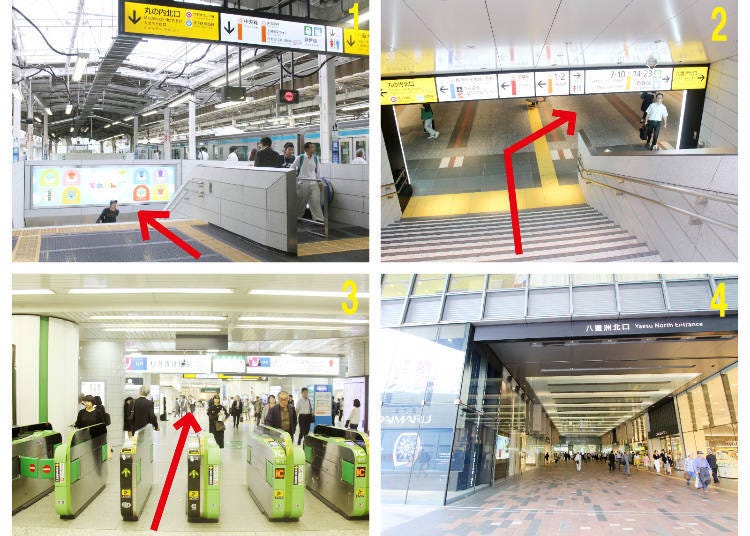
1. Descend either of the two stairs at the center of the platform and follow the signs of “Yaesu Central Exit.”
2. Continue straight ahead through the Central Passage, cross over towards the JR Information Center and continue going straight (be careful to not take the stairs down to the first basement floor).
3. Pass through the Yaesu Central Exit ticket gates.
4. Turn left right after the ticket gates, then go right again and straight ahead to go outside via the Yaesu Central Exit.
To the Yaesu South Exit
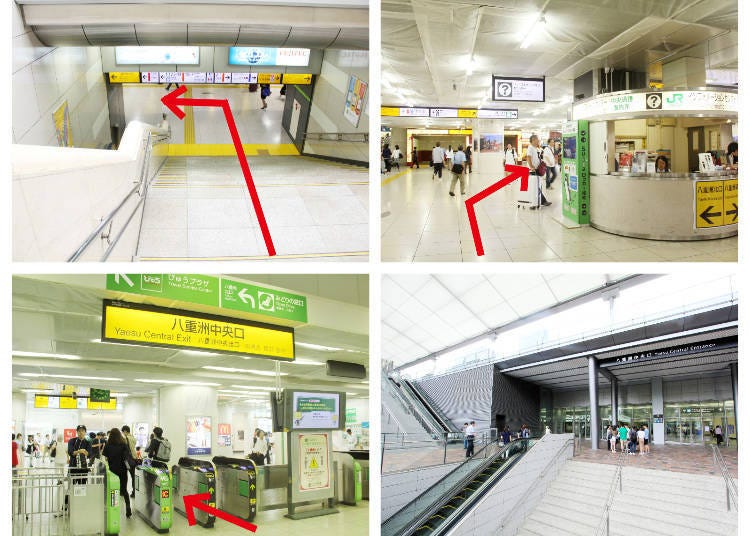
1. Descend either of the two stairs at the south end of the platform and follow the signs of “Yaesu South Exit.”
2. Continue straight ahead through the South Passage, lined by bento shops and confectioneries.
3. Go down a short staircase (or slope) and pass through the Yaesu South Exit ticket gates.
4. Go straight ahead to arrive at the Yaesu South Exit.
To the Yaesu Underground Central Exit
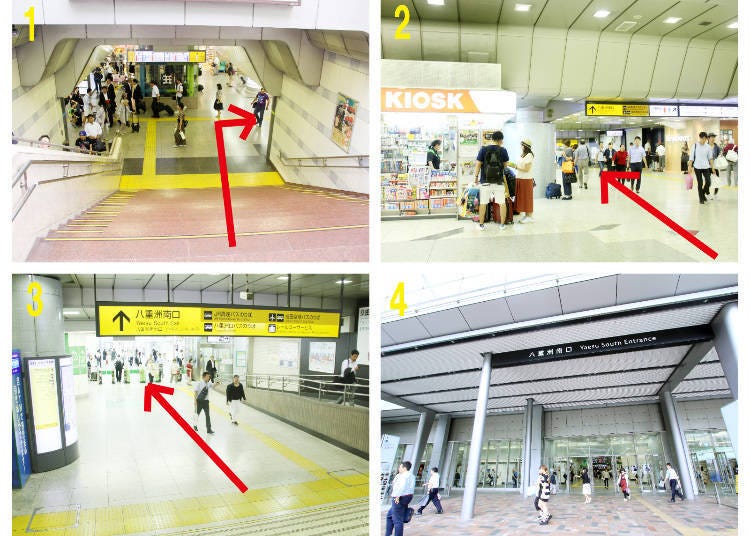
1. Descend either of the two stairs at the center of the platform, following the signs of “Yaesu Central Exit.”
2. Continue straight ahead through the Central Passage, cross over towards the JR Information Center and pass it to the left.
3. Go down the stairs to the first basement level.
4. You’ll see the Yaesu Underground Central Exit ticket gates.
To the Nihonbashi Exit
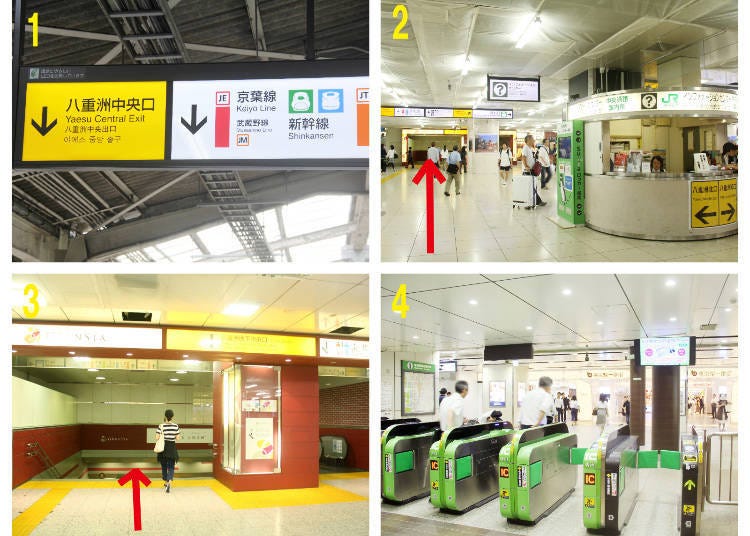
1. Pass through the Yaesu North Exit ticket gates.
2. Go straight ahead and turn left right after JR Tokai Tours.
3. Follow the signs saying “Nihonbashi Exit” and go straight ahead.
4. Leave the station via the Nihonbashi Exit. (The arrival area for JR Express buses is here.)
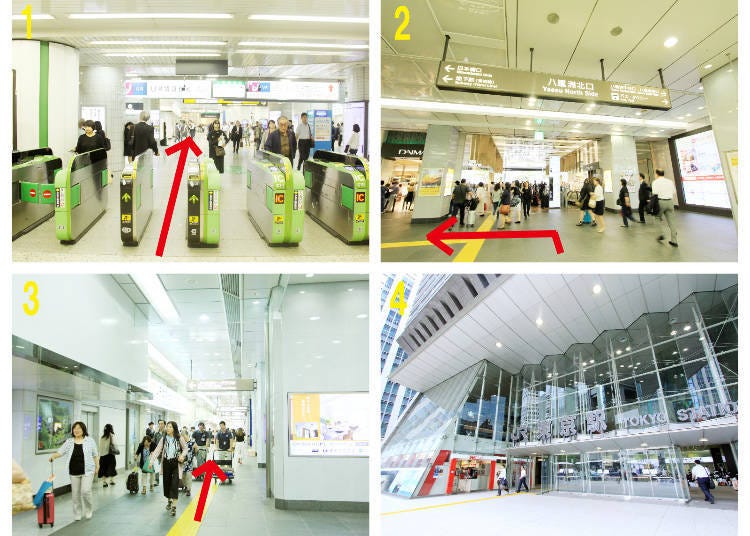
Transfers from Tokyo Station
Starting from JR’s Yamanote Line, a convenient line used by numerous tourists, let’s take a look at transfers to Keio Electric Railway, Tokyu lines, and Tokyo Metro lines.
● JR Yamanote Line → Tokyo Metro Marunouchi Line
1. Take the stairs to go down from the platform, then go down again to the first basement level via the stairs next to the Marunouchi Central Exit and head towards the Marunouchi Underground Central Exit.
2. Pass through the Marunouchi Underground Central Exit ticket gates.
3. Continue straight through the passage.
4. You’ll arrive at Tokyo Metro’s Marunouchi Line’s ticket gates and ticket area.
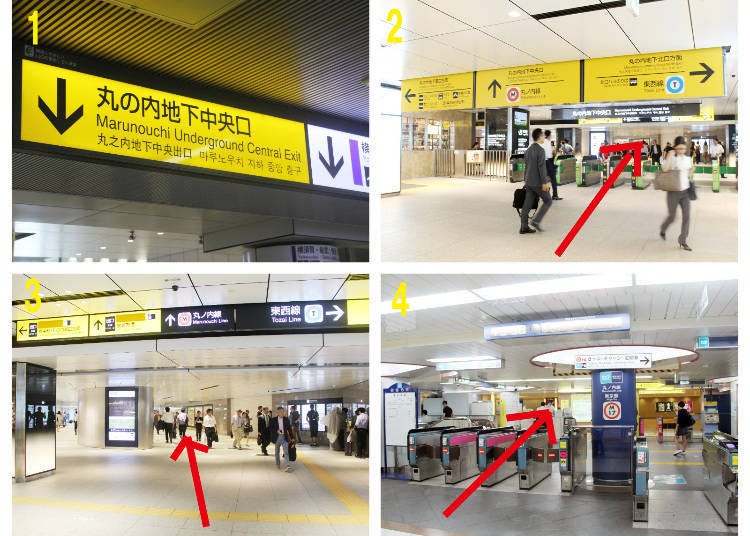
● JR Yamanote Line → Tokyo Metro Tozai Line
1. Take the stairs to go down from the platform, then go down again to the first basement level via the stairs next to the Marunouchi Central Exit and head towards the Marunouchi Underground North Exit.
2. Pass through the Marunouchi Underground North Exit ticket gates.
3. Turn right after leaving the ticket gates behind.
4. Enter the passage marked with “For Otemachi.”
5. Keep an eye on the lockers on the left and continue heading straight through the passage.
6. Go down via the escalator or take the stairs.
7. You’ll arrive at Tokyo Metro Otemachi Station.
8. You’ll arrive at the Tokyo Metro Tozai Line ticket gates.
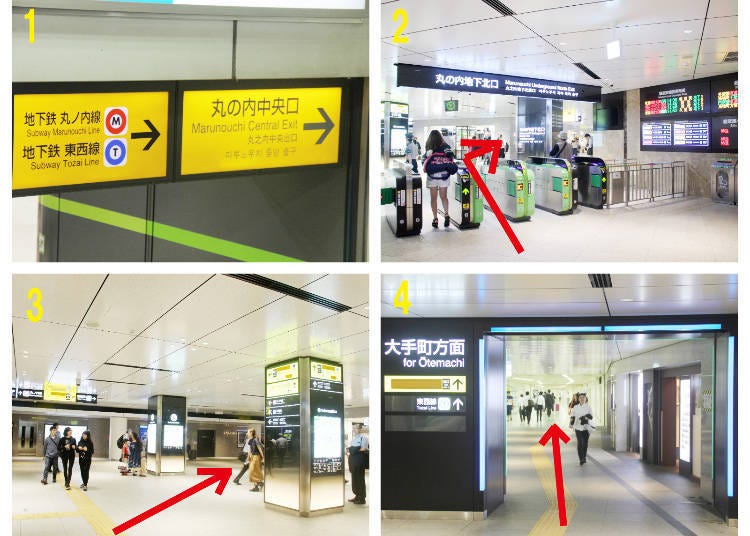
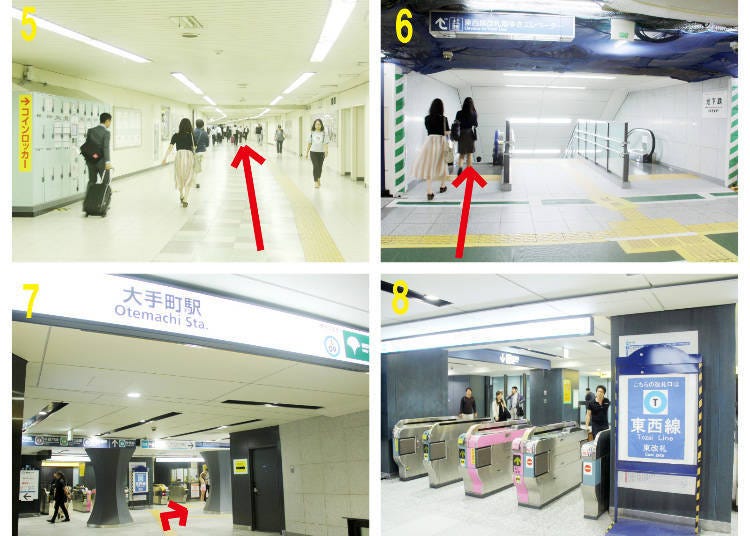
● JR Yamanote Line → JR Keiyo Line
1. descend the stairs on the platform and head toward Yaesu South Exit.
2. Continue along the South Passage toward Yaesu South Exit. Head to the right, following the signs of “Keiyo Line / Musashino Line.”
3. Continue through Keiyo Street towards the Keiyo Line.
4. Go down via escalator at the end of the passage.
5. Continue straight on the three moving walkways.
6. Descend the stairs and turn right.
7. Look for the signs saying “Keiyo Line / Musashino Line” and take the escalator to the third basement level.
8. Confirm whether it is platform 1 and 2 or platform 3 and 4, then descend the stairs to the fourth basement floor.

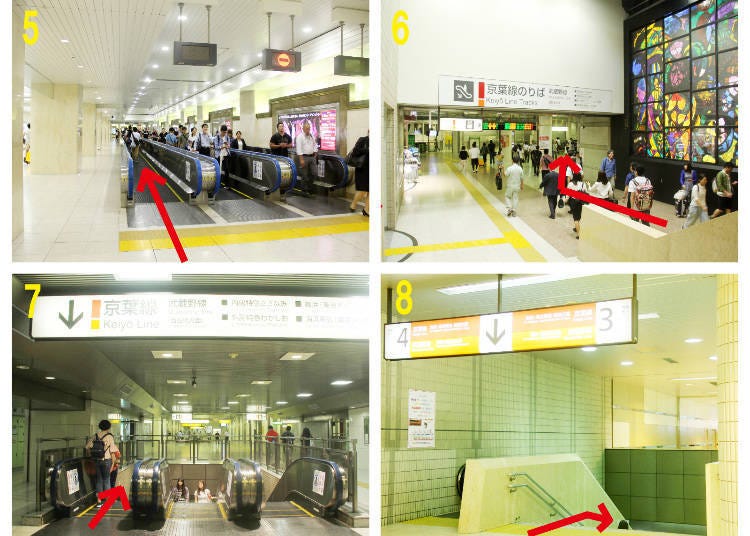
Taking the Keiyo Line from Tokyo Station to Tokyo Disney Resort
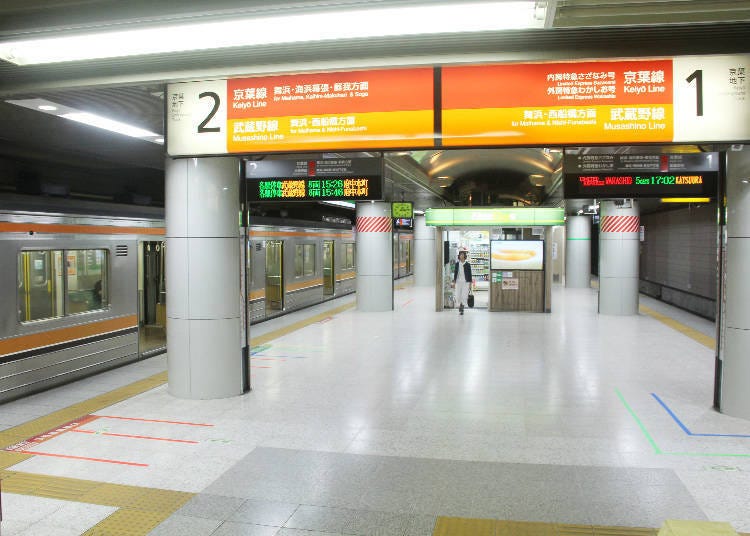
Maihama Station is the closest station to Tokyo Disney Resort. It’s only a 4-minute walk to Tokyo Disneyland and the station of the Tokyo Resort Liner can be reached in just 2 minutes.
Maihama Station is served by JR’s Keiyo Line which connects Tokyo Station with Soga Station in Chiba Prefecture. From Tokyo Station, it takes about 16 minutes with a regular train and 13 minutes with an express train.
The Keiyo Line platform is on the south side of Tokyo Station, located on the fourth basement floor, so transfer from the Yamanote Line or Chuo Line will take you about 10 to 15 minutes. Please see “JR Yamanote Line → JR Keiyo Line” above.
- Area
- Category
*Prices and options mentioned are subject to change.
*Unless stated otherwise, all prices include tax.
Popular Tours & Activitiess
-

A New Tokyo Landmark Is Coming in 2026, and It's Built for Modern Travelers
by: Guest Contributor
-

Farewell, Heavy Suitcases! Keisei Ueno’s New Service Makes Your Last Day in Tokyo Totally Hands-Free
by: Guest Contributor
-

PokéPark KANTO Is Finally Open! Tokyo's New Pokémon World Starts Before You Even Arrive (2026)
by: Guest Contributor
-
Ad

What Makes Japanese Yakiniku So Darn Good? Guide to Cuts, Heat, and Wagyu Know-How
-

Where to Buy a Japanese Kitchen Knife? Why Travelers Choose MUSASHI JAPAN's 14 Stores in Tokyo, Kyoto, and Nara
by: Guest Contributor
-
Ad

Japan’s Land of Yokai Monsters and Spooky Stories! A Deep Journey to Mysterious San’in (Tottori & Shimane) for Seasoned Travelers
-

Asakusa Ojima: Experiencing Edo Kiriko Glass Cutting at a Traditional Family Workshop in Asakusa
-

Autumn in Japan 2026: Fall Foliage Forecast & Where to Enjoy the Colorful Leaves (+Tour Info)
-

8 Unfamiliar (But Totally Normal) Customs in Japan!
-

Experiencing Japanese Culture Firsthand: Authentic Tea Ceremony & Taking On Japanese Cooking!
-

Great Food With a View: Top 4 Restaurants You Won't Forget in Omotesando, Tokyo
-

Ueno Station Area Guide: Fun Ways to Explore Tokyo's Popular Destination (Area Map & Sightseeing Tips)
- #best ramen tokyo
- #what to buy in ameyoko
- #what to bring to japan
- #new years in tokyo
- #best izakaya shinjuku
- #things to do tokyo
- #japanese nail trends
- #what to do in odaiba
- #onsen tattoo friendly tokyo
- #daiso
- #best sushi ginza
- #japanese convenience store snacks
- #best yakiniku shibuya
- #japanese fashion culture
- #best japanese soft drinks


















